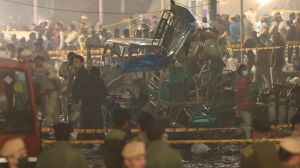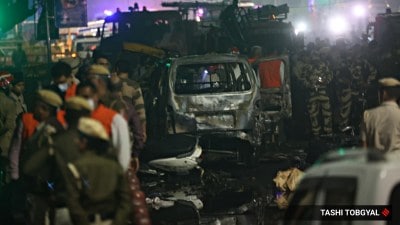Rajasthan HC to examine Single Bench order on AAG Padmesh Mishra’s appointment
Rajasthan Chief Justice M M Shrivastava recuses himself from the case
 Regarding the objection over lack of 10 years’ experience, the court had said that this requirement “has not been held as an essential and mandatory prerequisite for appointment of Additional Advocate Generals.” (File Photo)
Regarding the objection over lack of 10 years’ experience, the court had said that this requirement “has not been held as an essential and mandatory prerequisite for appointment of Additional Advocate Generals.” (File Photo)A Division Bench of the Rajasthan High Court will now examine the order passed by the Single Bench in the matter concerning Padmesh Mishra’s appointment as the Additional Advocate General for Rajasthan before the Supreme Court of India.
During the hearing Thursday, the Division Bench comprising Justice Inderjeet Singh and Justice Pramil Kumar Mathur directed appellant petitioner, advocate Sunil Samdaria, 50, to supply copy of memorandum of appeal to Bharat Vyas, the AAG who had represented the state government before the Single Bench. The matter has now been listed for April 2.
Earlier on March 3, Chief Justice Manindra Mohan Shrivastava had recused himself from the case.
In his original petition which was heard by the single bench, Samdaria had said that Mishra was appointed as an AAG even though he did not have the requisite 10 years’ experience to be eligible as an AAG as per the state’s Litigation Policy; that his appointment was not made with effective consultation of the Advocate General and was thus in gross violation of Clause 14.2 of the Litigation Policy of 2018; and that to circumvent the prescription of requirement of minimum experience of 10 years, government had made an eleventh hour amendment on August 23, 2024 incorporating Clause 14.8 in the Litigation Policy, enabling authority of the appropriate level to appoint anyone any counsel on any post on the basis of their expertise.
In its order dated February 4, the bench of Justice Sudesh Bansal had said that although the state government is expected to follow the guidelines prescribed in the Litigation Policy, “it is also equally true that such policy is in the nature of executive instructions for guidance, which cannot be claimed to have a statutory force like a legislation/ legal statute before the court of law.”
Rejecting the challenge to the addition of a new clause in the policy, the HC had said that “the Supreme Court has held that the Courts ought not to venture into the question as to whether a particular public policy is wise or not and the Court should be loathe in interference with policy decisions.”
Regarding the objection over lack of 10 years’ experience, the court had said that this requirement “has not been held as an essential and mandatory prerequisite for appointment of Additional Advocate Generals.”
In his present appeal, Samdaria has prayed for quashing the judgement of the Single Bench.
Samdaria has pleaded in appeal that the learned single judge Bench “has committed a serious error in holding that the office of AAG is not a public office” as the test for determining a public office is whether it is “remunerated by Government” and that their appointment “under aegis and orders of the Governor” further supports this classification.
He has also claimed that the Bench has enunciated wrong proposition of law in an attempt to validate an otherwise “unlawful” appointment and “ignores the judgment of Supreme Court over the issue.”
As per Samdaria, another major ground is the alleged procedural irregularities in the appointment process, wherein he states that the government made the entire Litigation Policy “redundant” by incorporating Clause 14.8, and that this exhibits “malice in law and gross arbitrariness.”
He has also stated that Clause 14.8 “gave an unrestricted, untrammelled and uncanalised power to the authority of the appropriate level to appoint any counsel of his choice”, bypassing the minimum experience requirement set in Clause 14.4 of the Litigation Policy.
He states in the appeal that Mishra’s appointment was done in a single day on 23 August 2024, itself when Clause 14.8 stood incorporated, which makes it “beyond comprehension as to how Mishra’s expertise “could have been evaluated” so quickly on the same day of incorporation of Clause 14.8 without following any transparent process and making search for meritorious candidates. He said that “evaluation of expertise by an objective method is a time-consuming process”, and thus could not have been made in a single day on the date of incorporation of policy thereby making the appointment indefensible.







